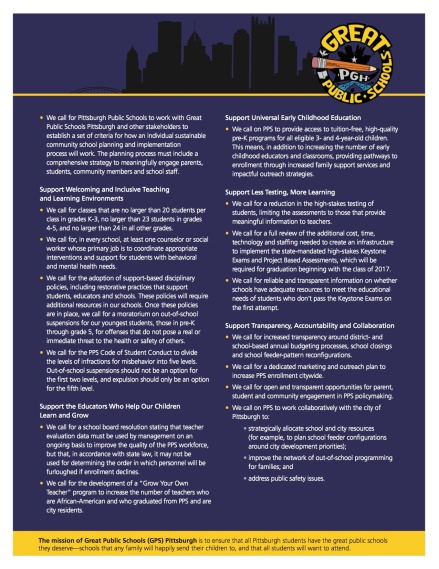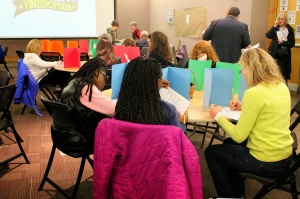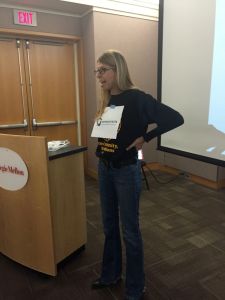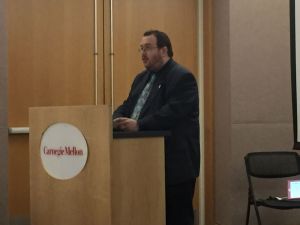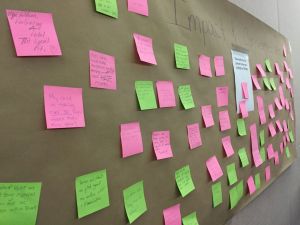As we head into several weeks of high-stakes-testing here in Pennsylvania, I would like to share with you the religious reasons my children will not be taking the state mandated PSSAs. Here is an open letter I sent to Dr. Linda Lane, Superintendent of Pittsburgh Public Schools; Dr. Lisa Augustin, Director of Assessment; Ms. Jamie Kinzel-Nath, Pittsburgh Colfax K-8 principal; and all of our children’s wonderful teachers.
April 10, 2015
Dear Dr. Lane and Ms. Kinzel-Nath:
Pursuant to Pennsylvania Code Title 22 Chapter 4, section 4.4 (d)(5) I am hereby exercising my right as a parent to have my children, ____________, excused from PSSA testing on the grounds of my religious beliefs. Please allow ___________ to pursue alternate educational activities such as a research project or volunteering in younger classrooms during testing.
I could stop my letter right there, as that is all that is legally required by the state in order to excuse our children from testing. However, as this is our third year writing such letters, I would like to explain the religious grounds we have for refusing to allow our children to be tested. Even though, under law, no state or school official is permitted to ask us about our faith nor require “proof” of our beliefs, I would like to share these religious reasons with you.
We belong to First Unitarian Church of Pittsburgh, a member of the Pennsylvania Interfaith Impact Network (PIIN), which is active in education justice. Every Sunday, we recite seven principles that unite Unitarian Universalists. Most of these principles are basic moral and philosophical statements shared by all of the world’s major religions. They reflect the common values of most faiths, from “love one another” and “do unto others,” to respect for the spark of the divine in each of us, and the ethical-humanist imperative to leave this world a better place. Please allow me to explain how each of these seven principles has led us to refuse high-stakes-testing for our own children, and on behalf of all children.
- The inherent worth and dignity of every person.
Every child is valuable – priceless – and has the human right to a rich, full education. Respecting the inherent worth of every child also means treating each student as an individual, and not a widget being produced in a factory. Standardized testing, tied to an ever more standardized common core curriculum, sorts students into categories (“below basic,” “basic,” etc.) There are serious consequences to this sorting and labeling (see below), but the underlying premise of this standardized high-stakes-testing is to compare and rank students – not to support the individual learning of each student.
This is clearly evident when schools use standardized, normed tests, which force all students into a bell curve, guaranteeing that a large proportion of the children will fail. To get that nice bell shape of test results, with exactly half of the children falling on the “below average” side of the curve, the tests are carefully designed with purposefully misleading questions. For instance, test makers will use tricky sound-alike answers to intentionally trip up English language learners, or culturally specific clues most easily decoded only by students from wealthy families. Pittsburgh is subjecting students to the normed GRADE test not once, but three times a year (a result of accepting state money that came with testing strings attached). Teachers have been reporting the problematic GRADE test questions for years, but the test-maker has not changed them because this “assessment” requires a set failure rate. In what way does this kind of standardized testing respect the inherent worth of our students? When students’ test scores are then displayed for all to see on “data walls” (an increasingly common practice in our schools), how does this respect the dignity of each child?
- Justice, equity and compassion in human relations.
While advocates claim that high-stakes-testing will hold teachers and schools accountable for student learning and therefore promote equity, it often does the exact opposite by reinforcing inequality. High-stakes-testing labels our schools as “failures,” but never results in additional resources to actually help kids. Instead, “failing” schools are often targeted for closure. When you look at the pattern of school closures across the country – including here in Pittsburgh – you can see that districts have closed schools in predominantly black and brown neighborhoods, displacing some students multiple times. Our communities of color have been harmed the most, with places like Oakland and Hazelwood turned into education deserts without a single neighborhood public school.
Schools labeled as “failing” on the basis of student test scores are often targeted with other “reforms” that rarely help children. Our own beloved Colfax provides an excellent example of the “disruptive innovation” imposed on supposedly failing schools. Nine years ago when our family first started at Colfax, its large achievement gap had recently earned it a designation as a “turnaround school.” The district fired every single teacher and the principal then handpicked an entirely new teaching staff. The idea, of course, was that we had to get rid of the “bad” teachers and hire only “great” teachers and that would solve the problem of low test scores. Fast forward almost a decade and you can see that this didn’t work: Colfax still has one of the largest achievement gaps in the city (which is really an opportunity gap made highly visible by the presence of families from some of Pittsburgh’s wealthiest and poorest communities together in the same school).
During this same decade, Colfax students also experienced a relentless series of “reforms,” all aimed at increasing test scores. When we started, Colfax was a Spanish language immersion school, then we lost the extra language instruction to become an “Accelerated Learning Academy” focused on reading and math. We got an America’s Choice curriculum that was supposed to solve everything and added extra periods of reading. We got a longer school day and a longer school year. We got a Parent Engagement Specialist. Then we lost the curriculum, lost the extra time and days, and lost the parent specialist. The district changed to a 6 day week, so we could cram in extra reading and math periods, since these are tested subjects, resulting in a net loss of music, art, language, and physical education. With state budget cuts we lost more music and athletic programs, and we even lost our after school tutoring program aimed at those very students whose test scores continue to cause so much alarm. And class sizes ballooned to 30, sometimes 35 and more students.
Imposing constant churn and disruption on our most vulnerable students in the pursuit of higher test scores is not education justice. Worse, the relentless high-stakes-testing has served to re-inscribe inequality. We recently heard from Jon Parker, a Pittsburgh high school teacher, who explained what high-stakes-testing is doing to students’ sense of self worth in his classroom. Every year, he asks his students to write him a letter introducing themselves. In his class of struggling readers this year, over half of the students included their most recent PSSA rating as part of their introduction. They literally said things like, “I’ll work hard but I’m below basic.”
Mr. Parker explains, “the tragic message from our high stakes test environment is ‘you are your score.’ And if we tell a student he’s below basic regularly from the time he’s in kindergarten, what else would we expect of him? One of the stated goals of No Child Left Behind was to combat the ‘soft racism of low expectations.’ But instead it has created a vicious cycle of self-fulfilling prophecies. ‘You have failed in the past; you will fail forever.’ I cannot imagine where I would be if I had that school experience, but I can guarantee you I wouldn’t be here.”
Mr. Parker also examined the ways in which high-stakes-tests are used to exclude students from high-quality courses and programs. He gave the example of a young woman of color in his class right now with a 4.0 GPA – “one of the most well-rounded and motivated students I’ve ever had” – who will be excluded from taking the advanced math and science courses she would like to take next year solely because of a test score.
What’s more, Mr. Parker argued that if high-stakes-tests are meant to indicate which students need support so teachers can help them, they are miserably failing this most basic task. Instead, administrators and teachers makes lists of “bubble students” who are close to the passing mark and focus their energy on moving these students up to “proficient.” The students with the most needs, struggling at the very bottom, are passed over: “they are neglected, perpetuating what has probably been the whole of their educational experience. ‘You’re a failure; you’re not worth our time.’ Then we wonder why we have such disparity in opportunities, a lack of student or family buy-in, negative attention seeking behaviors (for which we then suspend students).”
So if our students who need the most help never get that help, where is the equity? If a young woman of color with 4.0 GPA wants to take advanced math and science classes but and can’t because of a single test score, where is the justice? If children now label themselves with their own test scores and literally believe themselves to be “below basic,” where is our compassion?
- Acceptance of one another and encouragement to spiritual growth in our congregations.
Part of accepting one another is recognizing that we each have unique gifts and strengths. We are not all the same. Some students excel in trombone or slam poetry, or are highly empathetic or fantastic story tellers: none of which gets measured by high stakes testing. I am concerned about the intellectual growth of our students as well as the nurturing of their individual spirits. I believe in real learning and more learning time for our children. I support quality assessments that help our children learn and provide meaningful information to teachers to help them meet the needs of individual students. I want tests, ideally designed by teachers, which align with the curriculum and give timely, informative results to parents and students.
- A free and responsible search for truth and meaning.
As a scholar, I am committed to a free and responsible search for truth and I highly value data and evidence in that quest. We now have a mountain of evidence about the negative consequences of the high-stakes attached to testing, as well as the over-use and mis-use of testing. To summarize, these are some of the high-stakes for students:
- Lost learning time: there’s less time for learning with testing and test prep (for instance, Pittsburgh students now take 20-25, or more, high-stakes tests a year). We have reports in the district this week of students covering up the walls to prepare for testing, rather than spending their time learning.
- Reduced content knowledge: research shows that students are learning how to take high-stakes-tests, but cannot demonstrate subject mastery when tested in a different format. In other words, they are not actually learning. [Koretz, 2008]
- Narrowed curriculum: with a focus on reading and math scores, students lose history, civics, world languages, the arts, and other programs.
- Decreased ability to write: writing portions of high-stakes standardized tests are graded by hourly employees – not teachers – who are often recruited from Craig’s list and paid minimum wage. To “pass” these tests, students are taught a narrowly confined way to answer writing prompts.
- Subjected to stale, dull methods: educators report that the focus on high-stakes-testing and test-prep means they cannot be creative and innovative in their teaching.
- Missed teachers and classes: intense security measures prevent teachers from overseeing testing in their own classrooms, so teachers from non-testing classrooms (such as Kindergarten teachers) are frequently pulled from their students to proctor exams.
- Used as guinea pigs: schools and districts routinely agree to allow their students to “field test” new questions and entire exams for testing corporations without notifying parents or compensating students. Teachers are expected to give a test they did not design, on material they did not teach, to students who will not learn anything from the experience. Those teachers, students, and their parents will never see the results. Last year when the district field-tested text dependent analysis, one principal told us students ripped up the tests and said they couldn’t do it. Field testing further reduces actual learning time and contributes to the stress imposed on our children.
- Shut out of programs: high stakes exclude students when test results count as extra weight in magnet lotteries or for entrance to gifted programs or advanced courses.
- Diverted resources: the hundreds of millions of dollars spent on testing in Pennsylvania are not available for classroom education. Most high-stakes tests are written by and benefit the bottom line of a handful of large international corporations. For instance, the new School Performance Profile system, largely based on student test scores, cost Pennsylvania taxpayers $2.7 million to develop and it will cost an estimated $838,000 every year to maintain. This does not include the five-year, $201.1 million contract with Data Recognition Corporation to administer high-stakes-tests to our students. Dr. Greg Taranto, Pennsylvania Middle School Teacher of the Year and member of Gov. Wolf’s education transition team, recently shared with us that state testing will cost us $58 million this year!
- School closures: schools labeled as “failing” on the basis of test scores can be threatened with closure. These schools are usually in communities of color.
- Loss of curiosity and love of learning: bubble tests are developmentally inappropriate for the youngest learners, yet are routinely being pushed down into Kindergarten in an attempt to get students “test ready.” The emphasis on “skill drill and kill” fails to stimulate children’s imagination and limits their natural curiosity. At Colfax, I’m concerned this has meant that our “enrichment” period has turned into an extra period of reading skills for most students.
- Blocked access to facilities: as more and more tests are given on-line, many schools find their computer labs taken over by testing for weeks on end and not available for learning.
- Harmful stress: children are pressured to not only demonstrate their knowledge but to represent the effectiveness of their teachers and their schools. Teachers are reporting children throwing up, losing control of their bowels, and increased commitments for psychiatric and anxiety issues. Mandated testing conditions, particularly for some special education students, border on child-abuse and some parents are reporting evidence of self-harming behaviors.
- Internalized failure: struggling students forced to repeatedly take tests that label them “below basic” begin to believe they are “bad” or “worthless” students who cannot succeed in school.
- Grades: some high-stakes tests are included in students’ grades.
- Graduation requirements: as Pennsylvania introduces the Keystone graduation exams, evidence suggests that up to 60% of our students of color will be forced out of school without a diploma on the basis of a single score.
- Altered school culture: schools must empty their walls and hallways for many weeks; classes are under lock-down with limited access to restrooms; some turn to daily announcements or even pep rallies to “prepare” students for testing and all-school field trips to “celebrate” testing (rather than actual learning).
- Private data tracked: testing companies are tracking an enormous amount of information on our students, from test scores to even discipline data on children. Dr. Taranto told us, “this fact is not disclosed to parents” and he asks, “Who has access to this information? Who will have access to this student data down the road?”
- Loss of enrichment: schools are eliminating academic field trips and pressuring teachers not to participate in activities that would take students out of school to maximize classroom time (for test prep). During PSSA testing, Pittsburgh’s gifted center also closes so those teachers can be reassigned to proctor the exams in other district schools.
With all of that evidence that high-stakes-testing is hurting students, changing their schools for the worse, and reducing real learning, why are we still giving so many standardized tests? Steve Singer, a teacher in the Steel Valley School District, points out that some tests can serve a political purpose. For instance, the DIBELS test, used to evaluate reading, is owned by Rupert Murdoch, and “cut scores are being artificially raised to make it look like more students are failing and thus our schools aren’t doing a good job.” Yet Mr. Singer explains that the DIBELS “doesn’t assess comprehension,” and “rewards someone who reads quickly but not someone who understands what she’s reading.” Also, he explains that, “focusing on pronunciation separate from comprehension narrows the curriculum and takes away time from proven strategies that actually would help [a student] become a better reader.”
My son’s experience with the DIBELS illustrates the way in which standardized tests can be used as gatekeepers, excluding even very high achieving students from accessing appropriate programs. My son was a “late” reader (which is not really true: he learned to read when he was developmentally ready in the third grade, and became a voracious, wonderful reader). But when he was in second grade, we were told his DIBELS score was too low to allow him to take an accelerated math class. He had taught himself multiplication at the age of four and was bored out of his mind in class. But the teacher had her orders: students needed to be reading 100 words per minute or could not advance to anything else. During our conversation with her about this, she called our son over and said, “I notice that you spend a lot of time looking out the window, like you were just now. Why are you daydreaming?” To which he answered, “Well, I was thinking about how if you have a ball in your hand, and drop it, and it hits the floor but doesn’t come all the way back up, where did that energy go?” I kid you not. He was seven years old and this was his response. The teacher looked right at us and said, “But see? He’s not reading 100 words per minute.”
Ideally, teachers are able to use test scores as just one data point among many to determine what students need to support their learning. But the hyper-focus on testing – and accountability measures that hold teachers responsible for getting every student over developmentally-arbitrary thresholds – means that time and again students are not treated as whole, complex learners, but rather reduced to a single score.
Testing advocates tell us that we must test every child, every year in order to identify inequality and drive reform (something no other high-education-achieving nation in the world does). But we have ample evidence from education researchers that high-stakes-testing is not improving schools. Over 2,000 education researchers recently sent an open letter to the Obama administration and Congress: citing reams of data, the researchers wrote, “we strongly urge departing from test-focused reforms that not only have been discredited for high-stakes decisions, but also have shown to widen, not close, gaps and inequities.” The letter went on to quote evidence at length from a new policy memo from the National Education Policy Center, which effectively summarizes a “broad research consensus that standardized tests are ineffective and even counterproductive when used to drive educational reform.”
Evidence also shows serious problems with using high-stakes-testing to evaluate and rate schools. For example, a detailed analysis of the state’s new School Performance Profile (SPP) rating system found that – despite its claim to use “multiple measures” to evaluate schools and teachers – 90% of the calculation is based on high-stakes standardized tests. Yet “these measures are closely associated with student poverty rates and other out- of-school factors.” In other words, the tests are very good at measuring one thing: a family’s socio-economic status. Even the much-touted Pennsylvania Value-Added Assessment System (PVAAS) component of the score, which is supposed to calculate projected student growth while controlling for out-of-school factors, instead strongly correlates with poverty. The report raises “questions about whether the measures are a valid and reliable measure for purposes of school accountability.” In essence, schools are being held accountable, not for what students learn, but for the poverty level of the families they serve.
Similarly, teachers are being evaluated on the basis of the test scores of their students. This is an invalid use of data, violating a basic principle of assessment, since those tests were never designed to measure teacher effectiveness. You can’t take a test created to measure one thing and use it to measure another. Nevertheless, the entire teacher evaluation system is built on just this assumption. In fact, the Value Added Model (VAM) used to evaluate teacher “effectiveness,” assumes that student test scores are the result of a specific teacher, independent of all other factors. Yet the American Statistical Association (ASA) released a report last spring strongly warning about the limitations of VAM models, explaining, “Most VAM studies find that teachers account for about 1% to 14% of the variability in test scores” and that “Ranking teachers by their VAM scores can have unintended consequences that reduce quality.” The statistical researchers concluded, “This is not saying that teachers have little effect on students, but that variation among teachers accounts for a small part of the variation in scores. The majority of the variation in test scores is attributable to factors outside of the teacher’s control such as student and family background, poverty, curriculum, and unmeasured influences.”
My son’s situation reveals how inappropriate the entire VAM system can be. He is now several years ahead in math and takes his class at the high school each morning, before returning to Colfax for the rest of the day. However, the state would require him to take a PSSA several grade levels below where he is currently working. In what way would this assess his actual learning this year? This test is clearly not about helping my son in any way: it’s about evaluating his teacher. But if he scores at the very top of the PSSA, as he is bound to do, he is simply demonstrating the ceiling effect – there is no way to “show growth” for this student. Yet his teachers are accountable for the “growth” in each student’s test score. Furthermore, which teacher should we hold accountable for his score – the math teacher at Colfax who does not even have him in school this year? His math teacher at the high school who is not teaching him the material covered on the PSSA?
The American Education Research Association and the National Academy of Education released a report showing that VAM models are highly unstable: teachers rated highly effective one year, are frequently rated ineffective the next. Their ratings also differed substantially between classes taught in a single year. The report also confirmed that teachers’ VAM ratings were significantly affected by the demographics of the students they taught: even when VAM calculations tried to account for this, teachers’ scores were negatively impacted by working with poor students, English language learners, and students with special education needs. Finally, this report demonstrated that VAM ratings “cannot disentangle the many influences on students progress” and stated “most researchers have concluded that VAM is not appropriate as a primary measure for evaluating individual teachers.”
Yet as we place more and more emphasis on holding teachers, principals, and entire schools accountable for student test scores, we have seen a plague of adult cheating scandals erupt across the country. We should not be surprised, since Campbell’s Law in social science states that the more a quantitative measurement is used to make decisions, the more subject it becomes to corruption and the more likely it is to corrupt the thing it was supposed to measure. This is exactly what has happened, with the conviction of 11 former teachers in Atlanta this week who are now facing 5-20 years in prison for changing answers on student tests to raise scores. The superintendent of El Paso, Texas is currently in prison for taking low-performing students out of classes in order to increase the district’s test scores. In Ohio several cities apparently listed low-performing students as “withdrawn” to remove their scores from school totals. Some charter schools are well known for the “charter dump,” pushing students out just before testing season in order to inflate their test scores (sending students back into traditional public schools, where their new teachers will be held accountable for their learning). In Washington D.C. former superintendent Michelle Rhee – now the darling of the corporate reform movement who is famous for publicly firing a principal and massive school closures – oversaw her own “Erasure-gate” but was never held accountable. And right here in Pennsylvania our own former state Secretary of Education, Rom Tomalis, was caught both lying and cheating about student test scores (and then went on to occupy a ghost-job in the state capitol, making $140,000 a year but not showing up for work).
So why are we doing this? Why are we using our children’s test scores to feed a teacher evaluation system that not only doesn’t work, but actually harms teachers who work with our most vulnerable children? Finally, this Unitarian principle requires a commitment to a responsible search for truth, which means we have to be willing to examine the consequences of our own seeking. What if the collection and use of data on student achievement, as measured by test scores, is actually causing harm?
- The right of conscience and the use of the democratic process within our congregations and in society at large.
I am exercising my right of conscience by refusing to allow my children to take these tests. Our family cannot and will not be complicit in a system that we see harming others and damaging our common good.
High-stakes testing has also interfered with the democratic process. In many cities that lack democratically elected school boards, mayoral appointees have used high-stakes testing to label schools as failures and then moved to close them in unprecedented waves. Chicago is still reeling from the mass closure of 50 schools in 2013, almost entirely in communities of color. In cities like Philadelphia and New York, state or mayoral control has resulted in the privatization of public schools, handing over large numbers to private charter operators. Where is the democratic process when parents and communities no longer have a voice in public education and what is best for their children? When hedge fund managers are pouring enormous amounts of money into local school board races across the country to stack the deck in favor of privatization? When private charter operators are some of the biggest political donors in the state and refuse to comply with Pennsylvania’s sunshine open-records laws?
- The goal of world community with peace, liberty, and justice for all.
Pennsylvania’s new Keystone exams pose a particular concern for education justice, as they threaten to fail enormous numbers of poor students and students of color, preventing them from graduating (one of the highest stakes of all for students). The Pennsylvania NAACP has demanded the removal of the Keystones as graduation requirements, calling the use of these tests a “present day form of Eugenics.” With pass rates last year at some impoverished schools in the single digits, how will this form of high-stakes-testing create justice for all? And where there is no justice, there is no peace.
In a letter to the PA Department of Education, the NAACP wrote, “Attaching the Keystone Examinations to graduation is clearly based on the idea that it is possible to distinguish between superior and inferior elements of society through selective scores on a paper and pencil test. … Pushing masses of students out of high school without a diploma will create a subculture of poverty comprised of potentially 60 percent of our young citizens.” The letter uses strong language to object to the impact of high-stakes-testing on our most vulnerable children, including: “human rights violation…unspeakable horror…holocaust on our youth and society…life-long trauma… a system of entrapment for the youth of Pennsylvania…depraved indifference…deficient in a moral sense of concern…lacks regard for the lives of the children who will be harmed, and puts their lives and futures at risk…lynching of our own young.”
If we are serious about the goal of education justice, how can we ignore the impact these tests will have on an entire generation of children denied diplomas, with life-long consequences? Where is their liberty and their freedom?
- Respect for the interdependent web of all existence of which we are a part.
To me, this principle evokes Martin Luther King’s famous quote, “Injustice anywhere is a threat to justice everywhere.” We are all connected – in an interdependent web of existence – and the oppression and harm caused to other people’s children, causes harm to all of us. We are all harmed by allowing oppression and oppressive systems to continue.
It doesn’t have to be this way. This entire system is only about 15 years in the making. Other countries that we admire greatly for their highly effective education systems do not test like this. If researchers need data to compare we could test sample groups of students, rather than every child. We could test every few years, instead of every year. We could remove the high-stakes for kids and teachers, and go back to using assessments to measure student learning, with the goal of helping students. We could admit that our most vulnerable students – our students living in poverty, our English language learners, our students with special education needs – don’t need more testing, but rather smaller class sizes; a rich, engaging, culturally relevant curriculum; and well supported teachers with adequate resources.
Respectfully submitted,
Jessie B. Ramey, Ph.D.






